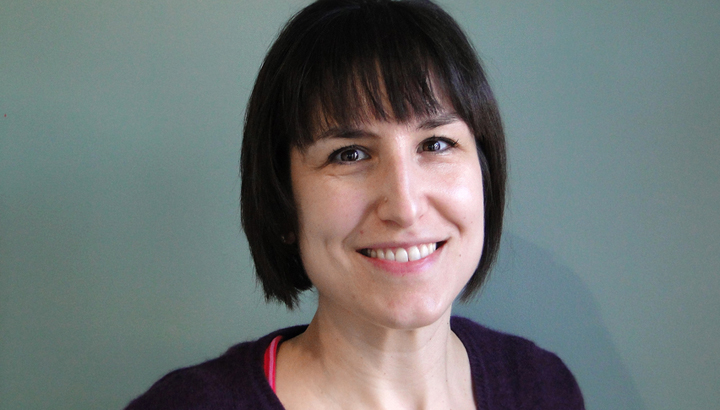A chance interaction changed the course of Amelia Gulkis’s career.
The UVM alumna, who graduated in 2001 with a degree in history, is now the chief operating officer of EnSave, an agricultural energy-efficiency company in Richmond that helps clients from around the country.
After earning her degree, Gulkis worked as a development researcher for UVM Medical Center before landing a job in 2004 at EnSave as a proposal writer. Gulkis learned about the unadvertised writing position at EnSave from a colleague in a book club. That colleague also sat on a local nonprofit board with EnSave president Craig Metz. For Gulkis, that connection changed everything.
“It’s so interesting that so much hinged on that interaction,” says Gulkis, who describes herself as an introvert. “I always think back to that, and it’s a strong lesson about what can come from networking and talking to people.”
![]() Gulkis was named COO of EnSave in 2010. The company has 22 employees and more than 200 subcontracted data collectors around the country.
Gulkis was named COO of EnSave in 2010. The company has 22 employees and more than 200 subcontracted data collectors around the country.
For our Alumni Advice series, we talked to Gulkis about what makes a good manager, questions she asks during an interview, and career lessons she has learned along the way.
As a chief operating officer, you clearly have some experience in management. What are two or three of the most important qualities a manager should have?
My job requires some personnel management, and these days I am fortunate to work with a strong team that helps me manage other staff and contractors. That said, I think a manager should be fair. You should be even-tempered and empathetic, but not let your emotions run the day. You’re not always going to be the most popular person in the office. A good manager is focused on helping others find solutions or remove roadblocks. Your job as a manager is as a facilitator to help others solve problems rather than thinking you have to solve every problem alone.
What qualities do you look for in a job candidate?
At the end of the day, someone’s attitude is more important than skills. You can always learn skills, but I look for a good attitude—someone who is committed to growing themselves and the company. How engaged is this person? Is the candidate interested in what he or she is doing and enthusiastic?
What are some questions you ask during a job interview?
One question I’ve been asking is, “If you were to come in next week and start this job, what would your approach be to learn about the position?” I ask this because as much as we have a training plan, success really depends on their ability to take ownership of their training. This question also gives me insight into their organizational approach and how much they can take on themselves.
What are some mistakes you see people make during the job search/interview process?
I’m always amazed that there are standard things about job searching that people don’t follow. For example, you need to proof your résumé, dress well for the interview, not be late, and send a thank-you note. Also, make sure you have questions for the interviewer. These are basic things you need to know for the job interview process. When I was looking to transition from UVM Medical Center to EnSave, I got plenty of rejections. Still, I always made sure to put my best foot forward.
What do you look for on a résumé?
It seems like the one-page résumé has gone by the wayside. When I see things go beyond two pages, especially with recent grads who don’t have much work experience, it begs a couple of questions. First, are they not able to edit down their work experience and highlight the most important points? Or do they think they need to use all that space because they have an inflated sense of accomplishment?
What about a cover letter?
A cover letter is more important to me than someone’s résumé. A cover letter is the creative side of the process and the person’s opportunity to tell me a story about why he or she should work with us, while a résumé is just the facts. I think people overlook the power of the cover letter.
Could you share some lessons you’ve learned in your career?
Whenever I put myself beyond my comfort zone, it’s benefited me. I always have to remind myself of this because it’s easy for me to keep doing my favorite things, but then I never grow and change. These days, I can be so busy with the day-to-day work that I have to make a conscious effort to set some goals for myself in addition to the goals I set for the company.
What would you say to a recent graduate feeling discouraged by the job market?
Before you get discouraged, do a reality check of sorts. Have people take a look at your résumé. Also, I think people are looking for the perfect fit right off the bat and coming out of school with pretty high expectations. I encourage people to focus on a job and get themselves into a company or organization. Delve into something, be as valuable as you can, and set yourself apart. In many ways, work is what you make of it.
Networking is clearly important and had a big impact on getting your foot in the door at EnSave. What advice would you give to people who might find networking difficult?
Networking can definitely be hard. It’s about getting out there and meeting people outside of your circle. For introverts, networking doesn’t have to be as forward as it sounds. Just being in the room with a professional group is a start because you’re benefiting from being around other people and making your presence known. Over time, you can build connections and start to feel more confident. Even if you don’t meet many people at an event or meeting, it’s worth it. Over time, you’ll make new connections and feel a difference.





